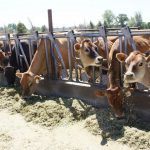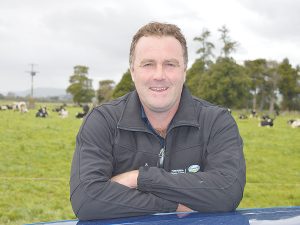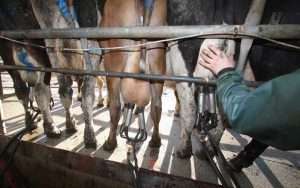
The company said the addition of new farms is an important tipping point as this year the milking ock maintained by external suppliers will exceed that of Spring Sheep’s own farms. These additional milking ewes will help grow the company’s product lines into new markets.
Spring Sheep Milk Co. said growing consumer awareness and clinical evidence of sheep milk’s nutritional and digestibility benets means demand is rising and the company is looking to partner with additional suppliers for the 2021 dairy season.
It said there has been interest from farmers looking to diversify or convert their existing farms. Interest is driven by multi-year xed price milk contracts, a low environmental land use, greater utilization of existing assets and succession opportunities for the next generation.
The new suppliers for this season are all in the Waikato and are using Spring Sheep’s bovine to ovine conversion model to convert existing cow infrastructure and repurposing the farm to suit sheep. This will see more than 250 hectares of land transfer from traditional cow dairy to sheep dairy.
“Over the past several years we have been developing and growing the Spring Sheep milk pool through producing leading sheep dairy genetics matched to proven farming models,” said Thomas Macdonald, Spring Sheep general manager – milk supply.
Typically, ocks are delivered in June ahead of the milking season to assist farmers by allowing a focus on the conversion process before receiving the ewes.
“Our use of a combination of leading European dairy breeds that were selected and adapted for New Zealand conditions through an extensive genetic development program has resulted in a high performance flock of milking sheep which continue to increase in yield and milkability traits season after season. Milk production is rapidly climbing through a longer peak milk period and greater days in milk, now over 240 days,” Macdonald said.
The top ewes at Spring Sheep’s pilot farms produced more than 500 liters this season, which the company said shows top global yields are achievable in a New Zealand farming system. Macdonald said supplier farmers can expect to produce 250 liters per ewe as a starting yield given the nature of learning a new farming system and adapting to sheep dairy farming. Long run yields of 350 to 400 liters per ewe on average are expected in the coming seasons.
In the 2019/20 dairy season new studies and trials on farm have led to eciencies in lamb rearing, animal health, grazing techniques and increased production per ewe with an overall drop in the cost of production.
“Seeing these farm systems gains combined with new generations of elite milking sheep has been exciting for Spring Sheep’s current suppliers and a great network of knowledge and support is now available for new farmers joining the industry,” Macdonald said.
The launch of Sheep Milk Full Cream Powder Pouches and infant formula product lines have absorbed every liter of production from the growing farmer group.
“Sheep milk is a fast growing dairy market segment, particularly in Asia, given its digestive and nutritional benefits compared to other dairy products,” Scottie Chapman, Spring Sheep CEO said.
“We’ve also seen further growth with the demand for our products rising considerably through the COVID-19 outbreak, especially with many governments backing the consumption of dairy for immune health.”
Spring Sheep markets its sheep milk nutritional products in Malaysia, Vietnam, Taiwan, and New Zealand. On the horizon is a launch into the China market, followed by Australia and select Asian markets next year.
To prepare for the upcoming growth, Spring Sheep has secured long term access to a new drying plant with Melody Dairy at Rurakura, a new 1.2t per hour spray dryer suited to fresh milk and manufacturing of Spring Sheep’s product lines. The new dryer is currently in commissioning and will be ready to take the increase in milk this dairy season.
























